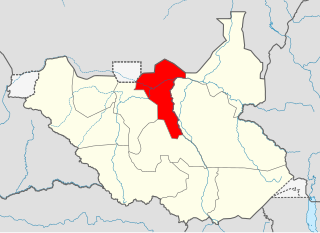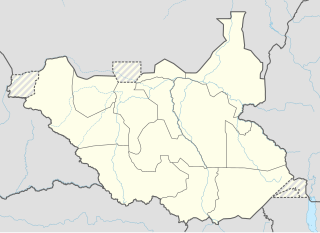
Unity State, also known as Western Upper Nile, is a state in South Sudan. Unity state is in the Greater Upper Nile region. Unity is inhabited predominantly by two ethnic groups: the Nuer majority, and the Dinka minority.

Petroliam Nasional Berhad, commonly known as Petronas, is a Malaysian oil and gas company. Established in 1974 and wholly owned by the Government of Malaysia, the corporation is vested with the entire oil and gas resources in Malaysia and is entrusted with the responsibility of developing and adding value to these resources. Petronas is ranked among Fortune Global 500's largest corporations in the world. In the 2017 Forbes Global 2000, Petronas Gas was ranked as the 1881st largest public company in the world.

OMV is an Austrian multinational integrated oil and gas company which is headquartered in Vienna, Austria. The company is listed on the Vienna Stock Exchange. In the 2020 Forbes Global 2000, OMV Group was ranked as the 441st -largest public company in the world.
Talisman Energy Inc. was a Canadian multinational oil and gas exploration and production company headquartered in Calgary, Alberta. It was one of Canada's largest independent oil and gas companies. Originally formed from the Canadian assets of BP Canada Ltd. it grew and operated globally, with operations in Canada and the United States of America in North America; Colombia, South America; Algeria in North Africa; United Kingdom and Norway in Europe; Indonesia, Malaysia, Vietnam, Papua New Guinea, East Timor and Australia in the Far East; and Kurdistan in the Middle East. Talisman Energy has also built the offshore Beatrice Wind Farm in the North Sea off the coast of Scotland.
Jill Seaman is an American doctor who used to work with Médecins Sans Frontières (MSF). She is a native of Moscow, Idaho and a graduate of Middlebury College and the University of Washington School of Medicine.
Adolf Henrik Lundin,, was a Swedish oil and mining entrepreneur. From the 1970s through the 1990s Lundin established numerous natural resource companies both in the mining sector and the oil and gas sector, which in turn made a number of world class discoveries in the Middle East, Africa, Europe and South America. Several of these deposits are still producing commercial quantities of oil, gas, gold, copper and other minerals; others are still under development. Lundin made a fortune in the 1970s when he came across huge natural gas fields in Qatar.

Tonj is a city in South Sudan.

The Comprehensive Peace Agreement, also known as the Naivasha Agreement, was an accord signed on January 9, 2005, by the Sudan People's Liberation Movement (SPLM) and the Government of Sudan. The CPA was meant to end the Second Sudanese Civil War, develop democratic governance countrywide, and share oil revenues. It also set a timetable for a Southern Sudanese independence referendum.

The Melut Basin is a rift basin in South Sudan. It is situated in the states of Upper Nile and Jonglei, south of the capital of Sudan, Khartoum and east of the river Nile. The Basin contains several hydrocarbon accumulations, although oil exploration, as elsewhere in Sudan, has been hindered by conflict. The largest oil field in the Basin is the Great Palogue Field with estimated reserves of 900 million barrels. The Melut oil export pipeline travels 1,380 km from Palogue to Port Sudan on the Red Sea, and has been on stream since June 2006.

China–Sudan relations refer to the bilateral relations between the People's Republic of China and the Republic of Sudan. China is currently one of Sudan's largest trade partners, importing oil and exporting low cost manufactured items as well as armaments into the country. Both states enjoy a very robust and productive relationship in the fields of diplomacy, economic trade, and political strategy. They formally established diplomatic relations on January 4, 1959 when Sudan formally recognized the sovereignty of the People's Republic of China and have since become close global allies, supporting each other in times of internal crises and international controversy such as during the Second Sudanese Civil War, the Darfur Crisis, and the Xinjiang Conflict. China continues to provide massive support to Sudan by developing its oil resources and supplying millions of dollars in loans, aid, foreign direct investments, and humanitarian assistance. In return, Sudan has become a reliable political and economic ally in the international arena, allowing China to maintain a significant stake in its oil sector.

Leer is a town in South Sudan. It is the capital of Southern Liech State and Leer County.

Melut is a community in the Upper Nile state of South Sudan, headquarters of Melut County.

The Adar oilfield, also known as the Adar Yale, Adar Yeil or Adaril field, is an oilfield situated in the Mabaan in South Sudan estimated to contain about 276 million barrels (43,900,000 m3) of oil. The Chevron Corporation discovered the Adar Yale field in 1981, shortly before the start of the Second Sudanese Civil War (1983–2005). Soon after Chevron had suspended operations in 1984, Sudanese government troops began attacking civilian settlements in the area, burning the houses and driving the people away, and in the late 1990s, Nuer militias from Nasir helped the army in clearing away the people to make way for the roads and infrastructure of the oilfield.

Block 5A is an oil concession in South Sudan. After oil field development began during the Second Sudanese Civil War, Block 5A was the scene of extensive fighting as rival militias struggled for control. Out of an original population of 240,000, an estimated 12,000 were killed or died of starvation and 160,000 were displaced by force. Production started in 2006. There is evidence that the environmentally sensitive marshlands beside the Nile are becoming polluted. European companies have been accused of complicity in clearance of the population from the oil field.

Duar is a large village in Koch County, Unity State, South Sudan. It is on the main oil road leading south from Bentiu, and is close to the Thar Jath Central Processing Facility in the Block 5A oil concession.

Thar Jath Airstrip is an airport in South Sudan.
The Relief Association of Southern Sudan was a humanitarian organization in Sudan, operating during the Second Sudanese Civil War. It was the humanitarian wing of the forces of Riek Machar 1991-2003. SPLA-Nasir set up RASS to function as a local civilian authority, and for liaisons with United Nations agencies and NGOs. As of 1999, Simon Kun served as executive director of RASS.
Riek Gai Kok is a South Sudanese politician. He is a Lou Nuer, hailing from Chieng Man-nyang/Diang-nyang. A veteran politician, he has been a member of parliament in both Sudan and South Sudan. As of 2013, he served as Minister of Health of South Sudan.

The mining industry of South Sudan started operating from the time South Sudan became a regional government of Sudan in 2005. Its inheritance was a well developed petroleum industry with an extensive network of pipelines passing through Sudan. However, contractual allotments in mining lacked any form of regulatory framework, resulting in the legislative assembly imposing a moratorium on mining licenses in November 2010. With independence in 2011, the petroleum industry was halted. Subsequent to this event, interest in mining non-fuel minerals has emerged and a new Mining Act has come into effect from December 2012.

The War of the Peters was a conflict primarily fought between the forces of Peter Par Jiek and Peter Gadet from June 2000 to August 2001 in Unity State, Sudan. Though both were leaders of local branches of larger rebel groups that were involved in the Second Sudanese Civil War, the confrontation between the two commanders was essentially a private war. As Par and Gadet battled each other, the Sudanese government exploited the inter-rebel conflict as part of a divide and rule-strategy, aimed at weakening the rebellion at large and allowing for the extraction of valuable oil in Unity State. In the end, Gadet and Par reconciled when their respective superiors agreed to merge the SPDF and SPLA.











